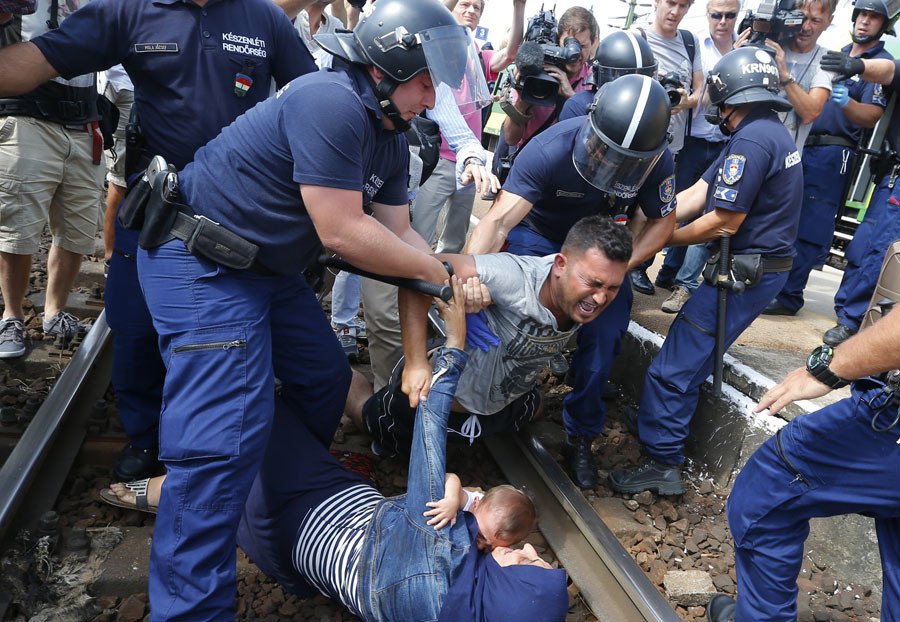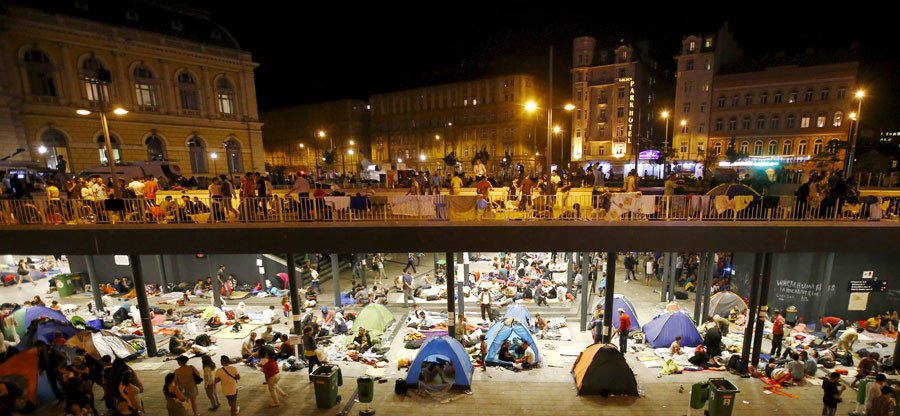Central European PMs reject EU proposal for refugee quota system
The EU states should take sovereign decisions in finding solutions to the migrant crisis, Polish Prime Minster Ewa Kopacz said after an emergency summit of Central European leaders on the spiking refugee influx in in Prague.
Follow RT's LIVE UPDATES on EU refugee crisis
"I think our tackling of the immigration problem has to be reasonable and also countries have to make sovereign decisions on the level of their exposure as well as engagement," Kopacz told reporters after meeting her counterparts from the so-called Visegrád Four – Czech Republic, Slovakia, Hungary and Poland – at a summit in Prague on Friday.
The group decided to oppose plans for quotas for refugees seeking asylum in the EU. The three states voiced solidarity with Hungary and expressed readiness to provide it with assistance.
"As an expression of their solidarity, the Prime Ministers stand ready to provide Hungary with further assistance," the PMs said in a statement.
The Czech and Slovak interior ministers proposed to create a train corridor from Hungary to Germany if the latter agrees to accept and not turn back refugees, who are already registered in the EU.
"If there is some public pledge from Germany that it will accept and not return Syrian refugees who are registered in some European country, we are ready to open a corridor if there is an agreement between Hungary and Germany," Czech Interior Minister Milan Chovanec said after meeting his Slovak counterpart Robert Kalinak in Prague.
Kopacz added that the scenarios for solving the migrant issue could be raised at the EU Council in October or September.
Hungary PM says refugees ‘German problem,’ slams EU inability to control situation http://t.co/9UpNVTeH0bpic.twitter.com/ApkTFn95go
— RT (@RT_com) September 3, 2015Dan Glazebrook, independent political analyst, told RT that central European states have been following Britain’s policy of rejecting the EU quota plan.
“The outer countries of the EU are of course the countries where the migrants first arrive. I don’t think that these countries would necessarily have felt so brazen completely rejecting the EU plan had it not been for [British PM David] Cameron’s outright rejection of such a system from the get go in the first place. And this has been the consistent role Britain has played in this crisis – it has been scuppering and acting as a lead for those kind of more racist policies within the EU.”
'Where are you going?' - 'Germany!' pic.twitter.com/RIH9hYPy9x
— Daniel Hawkins (@DanhawkinsDh) September 4, 2015Meanwhile Hungary organized a corridor from Budapest to the Austrian border, deploying over one hundred buses to clear refugee camps in the capital and pick up hundreds of asylum seekers traveling the main highway towards Vienna.
Exhausted families were happy to leave Budapest on their way to a “new life,” while the Austrian Red Cross prepared to host, feed and shelter up to 1,500 new arrivals at their border reception center.
Silence dawns on #Keleti 'tent city', abandoned clothes, toys, tents lie in the underpass pic.twitter.com/1eZGYu08T7
— Daniel Hawkins (@DanhawkinsDh) September 5, 2015Hungarian Prime Minister Viktor Orban told public radio on Friday that if the European Union does not protect its borders, tens of millions refugees may end up arriving in Europe.
"The reality is that Europe is threatened by a mass inflow of people, many tens of millions of people could come to Europe," he said. "Now we talk about hundreds of thousands, but next year we will talk about millions and there is no end to this," he said.
"All of a sudden we will see that we are in minority in our own continent," he said, urging Europe "to show strength in protecting our borders."
On Thursday, emotions ran high when Hungarian police allowed hundreds of refugees inside Budapest's main railway station, but then the authorities canceled all trains to Western Europe, causing chaos. Police declared Bicske railway station an 'operation zone', ordering all media to leave.
Officers earlier stopped the first train bound for the town of Sopron near the Austrian border, ordering refugees off at Bicske, where Hungary has a migrant reception center. The refugees reportedly banged on the train windows, shouting "No camp, no camp."
Police detained asylum seekers who lay on the rail tracks in protest against being sent to the reception camp. Those who were told to get off the train, forced their way back on, Reuters reported.

Viktor Orban has promised that by mid-September, Budapest should have a package of regulations in place, including a physical barrier, designed to tackle the growing number of refugees. He said Hungarians are “full of fear” because Europe is unable to “control the situation.” Following talks with the president of the European Parliament Martin Schulz, Orban noted the current refugee crisis was not an EU problem, but actually "a German problem."
EU's Mogherini ‘fed up’ with emotional uproar over drowned refugee kids’ photos http://t.co/mYCzFGhA6Spic.twitter.com/S1rTzDQqil
— RT (@RT_com) September 4, 2015Europe's refugee crisis has already been dubbed the worst since WWII, with a record number of 107,500 asylum seekers crossing the EU's borders in July. Europe appeared to be totally unprepared to deal with record high numbers of refugees.
“Eastern European countries are homogenous and not cosmopolitan as Western countries, so they get scared when so many people of different race and religion are coming in. No one knows where all this is going to,” Tony Robinson, co-director of the Pressenza international press agency, told RT.
Robinson added that Orban and other leaders are driven by fear.
“No chance they will agree to binding quotas. People are dissatisfied and fearful as no one has a coherent response to the problem. People in Budapest are outraged by what they see. Europe has never seen such a larger influx of migrants. The ultimate root of the problem is that the EU and NATO have been largely involved in conflicts in the Mid-East. Until the politicians start to tackle this root cause the situation will only get worse. The migrant debate is one of the key points driving Europe apart,” he said.

It took European leaders years to realize that the growing influx of refugees, many of them fleeing the war in Syria, won't be stopped until the fighting itself is ended.
While Angela Merkel has stated that it's important to fight the 'root causes' of the problem, David Cameron insisted the best solution to the crisis was to bring peace and stability to the Middle East. “We have taken a number of genuine asylum seekers from Syrian refugee camps and we keep that under review, but we think the most important thing is to try to bring peace and stability to that part of the world. I don’t think there is an answer that can be achieved simply by taking more and more refugees,” he said this week during a visit to Northamptonshire.
Spanish Prime Minister Mariano Rajoy has urged world leaders to engineer an end to the Syrian civil war.
“The situation in Syria is the cause of a large part of the problems we are currently having in Europe," Rajoy told COPE radio. "Settling the situation in Syria is of capital importance."
LISTEN MORE:
With up to 60 million people displaced globally, it's become common to see the terms 'refugee' and 'migrant' being used interchangeably in media outlets. According to the UN Refugee Agency, the two terms meanwhile have “distinct and different meanings, and confusing them leads to problems for both populations.”
The agency defines refugees as “persons fleeing armed conflict or persecution.” These are people for whom “denial of asylum has potentially deadly consequences.”
In contrast, migrants “choose to move not because of a direct threat of persecution or death, but mainly to improve their lives by finding work, or in some cases for education, family reunion, or other reasons.”
Polish Foreign Minister Grzegorz Schetyna said on Thursday that Europe should do its best to stop illegal migrants from entering. Warsaw is prepared to share the burden of giving shelter to refugees in real need.
MORE: #RefugeeCrisis in Europe is caused by flawed Western foreign policies – Putin http://t.co/LMMo2W6pHSpic.twitter.com/7L0zVyRJRo
— RT (@RT_com) 4 сентября 2015"All must be done to stop immigration at Europe's borders. We have to defend ourselves against illegal, uncontrolled immigration," Schetyna told public broadcaster TVP1.
German Chancellor Angela Merkel, whose country is expecting to cater for up to 800,000 this year, said earlier this week that refugees should be “fairly” distributed across the EU according to the EU member states' ability to receive them.
On Friday, the UN high commissioner for refugees Antonio Guterres called on the European Union to admit up to 200,000 refugees as part of a mass relocation programme that would be binding on EU states.
“People who are found to have a valid protection claim [in this initial screening] must then benefit from a mass relocation program, with the mandatory participation of all EU member states.” he said in a statement.
“Europe cannot go on responding to this crisis with a piecemeal or incremental approach. No country can do it alone, and no country can refuse to do its part,” Guterres added.
A European source told AFP that next week European Commission President Jean-Claude Juncker will unveil a plan for the relocation of at least 120,000 more refugees.
On Thursday, France and Germany announced joint proposals “to organize the reception of refugees and a fair distribution in Europe" as well as "converging standards” to strengthen the European asylum system.












